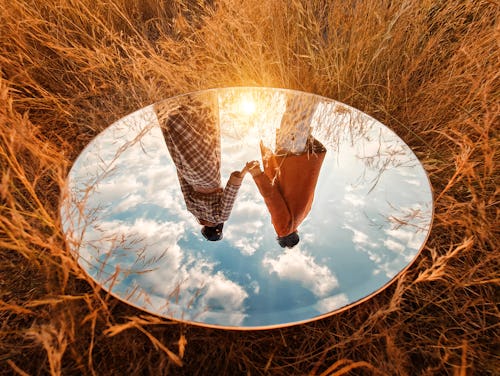Self
The Weird Reasons You’re Having Trouble Recognizing Faces Now
The skill peaks around age 30, research shows.

Getting older brings a lot of benefits — making your own money, being able to have sugary cereal whenever you want — but you may notice one weird consequence: not being able to recognize new faces easily anymore. You know the drill — some familiar-ish woman is waving you down at the park, saying how excited she is to see you, and you have literally no clue that she's your coworker's wife you met at the holiday party in 2017. Your old friends are still as memorable as they ever were, but fresh acquaintances (particularly those you made pre-pandemic) might slip more easily out of your head.
"When it comes to faces, it helps to think of the brain as a smart device with finite amounts of storage," Dr. Sanam Hafeez Psy.D., a neuropsychologist, tells Bustle. She explains that the longer you live, the more people you'll know, and the harder it is for the brain to retain all the images of the faces in your life, particularly if you don't see them regularly. Face recognition ability tends to peak at around the age of 30, per Science.
Some people naturally have face blindness, otherwise known as prosopagnosia or facial agnosia, where they can't recognize other people's facial features. Around one in 50 people have this issue, according to researchers. But Dr. Tamar Gefen Ph.D., assistant professor at the Mesulam Cognitive Neurology and Alzheimer's Disease Center at Northwestern University, tells Bustle that not being able to tell the various Karens in your life apart isn't a sign that you might be developing facial agnosia.
"Facial recognition depends on a number of factors," Dr. Gefen says. "One may not recognize a face because, well, it wasn't of particular interest, and not worth attending to." She explains that memory has three stages: encoding, or getting information in; recalling, or pulling information out; and retention, or holding onto information. The first stage is highly dependent on how much attention you're paying. This is why you might not remember somebody you met once at a party, even if they remember you; if you weren't interested or only saw them briefly, your memory didn't encode them.
Being good with faces isn't all about memory, either. A study published in Cognition & Emotion in 2019 found that if you've always been great at reading other people — as in, detecting their emotions from their faces — you might be good at recognizing them, too.
The COVID pandemic may make facial recognition a bit trickier than usual. Research published in Scientific Reports in December 2020 found that mask-wearing changes the way your brain processes faces. Normally, your brain looks at the entire face holistically to identify it — but the study found that when you can only see the eyes or eyebrows, it focuses on individual features. And that means you can't recognize the face, or read its emotions, as easily. For 13% of people in the study, masks meant they could barely recognize any faces at all.
It can be disorienting to start losing your ability to recognize those friends-of-friends-of-friends you never see anymore, but it's generally not anything to worry about. "The decreased ability to remember new faces has more to do with memory overload than with anything degenerative," Dr. Hafeez says. But if you suddenly notice you're not recognizing people regularly, particularly if you used to have a memory like a steel trap, Dr. Gefen recommends that you go see a doctor. "A formal neuropsychological evaluation can determine whether a person's inability to recognize a face is due to problems with memory, attention, visual processing, language (for example, naming the person), or even simple disinterest."
One trick science suggests: try to think of their name instead. A small study in 2019 in Quarterly Journal of Experimental Psychology found that people were more capable of remembering names than faces, even when they saw the same face multiple times. Get them to say their name, and it'll be more likely to spark something in your poor, overworked memory.
Experts:
Dr. Tamar Gefen Ph.D.
Dr. Sanam Hafeez Psy.D.
Studies cited:
Burton, A. M., Jenkins, R., & Robertson, D. J. (2019). I recognise your name but I can't remember your face: An advantage for names in recognition memory. Quarterly journal of experimental psychology (2006), 72(7), 1847–1854. https://doi.org/10.1177/1747021818813081
Connolly, H. L., Young, A. W., & Lewis, G. J. (2019). Recognition of facial expression and identity in part reflects a common ability, independent of general intelligence and visual short-term memory. Cognition & emotion, 33(6), 1119–1128. https://doi.org/10.1080/02699931.2018.1535425
Freud, E., Stajduhar, A., Rosenbaum, R.S. et al. (2020) The COVID-19 pandemic masks the way people perceive faces. Sci Rep10, 22344. https://doi.org/10.1038/s41598-020-78986-9
Megreya, A. M., & Latzman, R. D. (2020). Individual differences in emotion regulation and face recognition. PloS one, 15(12), e0243209. https://doi.org/10.1371/journal.pone.0243209